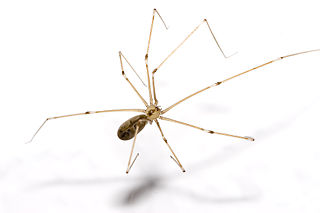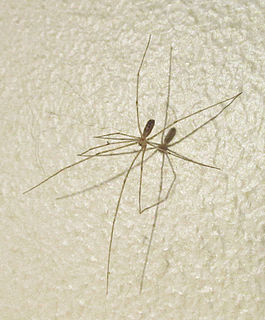
Huntsman spiders, members of the family Sparassidae, are known by this name because of their speed and mode of hunting. They are also called giant crab spiders because of their size and appearance. Larger species sometimes are referred to as wood spiders, because of their preference for woody places. In southern Africa the genus Palystes are known as rain spiders or lizard-eating spiders. Commonly they are confused with baboon spiders from the Mygalomorphae infraorder, which are not closely related.

The Pholcidae are a family of araneomorph spiders. The family contains over 1,800 pholcids, including those commonly known as the marbled cellar spider , daddy long-legs spider, granddaddy long-legs spider, carpenter spider, daddy long-legger, vibrating spider, gyrating spider, long daddy, and skull spider. The family, first described by Carl Ludwig Koch in 1850, is divided into 94 genera.

Ground spiders comprise Gnaphosidae, the seventh largest spider family with nearly 2,000 described species in over 100 genera distributed worldwide. There are 105 species known to central Europe, and common genera include Gnaphosa, Drassodes, Micaria, Cesonia, Zelotes and many others. They are closely related to Clubionidae. At present, no ground spiders are known to be seriously venomous to humans.

The Goliath birdeater belongs to the tarantula family Theraphosidae. Found in northern South America, it is the largest spider in the world by mass – 175 g (6.2 oz) – and body length – up to 13 cm (5.1 in) – but it is second to the giant huntsman spider by leg span. It is also called the Goliath bird-eating spider; the practice of calling theraphosids "bird-eating" derives from an early 18th-century copper engraving by Maria Sibylla Merian that shows one eating a hummingbird. Despite the spider's name, it only rarely preys on birds.
Agyneta micaria is a species of sheet weaver found in the United States and Canada. It was described by Emerton in 1882.

Micaria is a genus of ground spiders that was first described by Niklas Westring in 1851. They are 1.3 to 6.5 millimetres long.

Micaria pulicaria, the glossy ant spider, is a species of ground spider from the family Gnaphosidae with a Holarctic distribution.
Micaria rossica is a spider in the family Gnaphosidae, in the infraorder Araneomorphae . The distribution range of Micaria rossica includes North America, Europe, Turkey, Caucasus, Russia to Central Asia, and China.
Baryphyma trifrons is a species of dwarf spider in the family Linyphiidae. It is found in North America, Europe, the Caucasus, and in a range from Russian Europe to the Far East).
Hamataliwa helia is a species of lynx spider in the family Oxyopidae. It is found in the United States, Mexico, Guyana, Thailand, Malaysia (Sarawak), Brunei, and Indonesia (Sumatra).
Cesonia rothi is a species of ground spider in the family Gnaphosidae. It is found in the United States.

Enoplognatha caricis is a species of cobweb spider in the family Theridiidae. It is found in Europe, Turkey, a range within Russia, China, Korea, and Japan.

Psilochorus simoni is a species of cellar spider in the family Pholcidae. It is found in the United States, has been introduced into Europe, Turkey, and New Zealand.
Cheliferoides segmentatus is a species of jumping spider in the family Salticidae. It is found in a range from the United States to Guatemala.

Cithaeron praedonius is a species of true spider in the family Cithaeronidae. It is found in North Africa, Greece, Cyprus, Turkey, India, and Malaysia, and has been introduced into Brazil, Cuba, America, and Australia.

Hypochilus coylei is a species of lampshade weaver in the family of spiders known as Hypochilidae. It is found in the United States. This species inhabits a 35 mile north-south corridor of mountain range in western North Carolina. This species has a two year life cycle and feeds on crickets and spiders.
Micaria gertschi is a species of ground spider in the family Gnaphosidae. It is found in the United States and Canada.
Micaria longispina is a species of ground spider in the family Gnaphosidae. It is found in the United States and Canada.
Micaria longipes is a species of ground spider in the family Gnaphosidae. It is found in North America.









